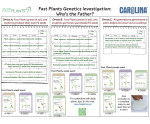Mendelian Inheritance Investigation Options Calendar Comparison
This PDF document shows three calendars side-by-side for comparing the time and materials needed for three different versions of the Fast Plants Mendelian Inheritance Investigation that is commonly called "Who's the Father?"
Option A involves students growing the F1 generation of Fast Plants in soil; students observe, then produce their own F2 seeds to generate phenotypic data from which they can infer genotypes.
Option B involves students growing the F1 generation of Fast Plants in soil; students observe, then purchased F2 seeds that were produced commercially are germinated for students to generate phenotypic data from which they can infer genotypes.
Option C involves students germinating the F1 generation of Fast Plants in a petri dish; students observe, then purchased F2 seeds that were produced commercially are germinated for students to generate phenotypic data from which they can infer genotypes.
Although this comparison calendar gives the monohybrid examples of conducting this investigation with a cross between homozygous Nonpurple Stem and Purple stem parental plants, the same investigation options can be used with dihybrid seed stocks in which the first generation (F1) is a cross between Nonpurple Stem and Rossette Dwarf seed stocks.
- NGSS.HS.LS3.2 Make and defend a claim based on evidence that inheritable genetic variations may result from: (1) new genetic combinations through meiosis, (2) viable errors occurring during replication, and/or (3) mutations caused by environmental factors. [Clarification Statement: Emphasis is on using data to support arguments for the way variation occurs.] [Assessment Boundary: Assessment does not include the phases of meiosis or the biochemical mechanism of specific steps in the process.]
- NGSS.MS.LS4.5 Gather and synthesize information about the technologies that have changed the way humans influence the inheritance of desired traits in organisms. [Clarification Statement: Emphasis is on synthesizing information from reliable sources about the influence of humans on genetic outcomes in artificial selection (such as genetic modification, animal husbandry, gene therapy); and, on the impacts these technologies have on society as well as the technologies leading to these scientific discoveries.]

Comments